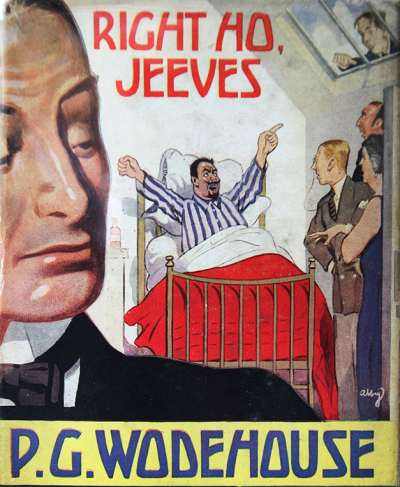Planet Telex: On the telegram in fiction

Right Ho Jeeves: the original cover from the 1934 British first edition �� Rod Collins/Alamy
By MATT MORRISON
Comedy loves telegrams. There is a strange poetry in their frantic demands. Their senders tend to be in love or custody. There is no quill, no candlelight; no time for grammar or dignity.
In P. G. Wodehouse���s Right Ho, Jeeves, telegrams offer a sort of prim hate mail ��� volleys of spite from the professionally constipated. When dodging an unspeakably dreary prize ceremony run by his Aunt, Mrs Dahlia Travers, our hero Bertie Wooster sends his solemn "Deep Regrets", to which Dahlia responds: ���Deeply regret Brinkley Court hundred miles from London, as unable hit you with a brick. Love. Travers���. She adds:
Consider you treacherous worm and contemptible, spineless cowardly custard . . . Stay where you are, then, and I hope you get run over by an omnibus. Love. Travers.
The "Love" wins it. ���Joyful tidings���, Bertie calls them.
In Evelyn Waugh's Scoop, the wrath is equally joyous. Telegrams launch the plot: William Boot, nature columnist for the Daily Beast, is wired, to his horror (and by mistake: the message is intended for another Boot entirely), from the high office of the newspaper magnate Lord Copper, who dispatches him to cover a "promising" war in Africa. The naive and hopeless Boot tries desperately to fit in, but is soon urged:
CABLE FULLIER OFTENER PROMPTLIER STOP YOUR SERVICE BADLY BEATEN ALROUND LACKING HUMAN INTEREST COLOUR DRAMA PERSONALITY HUMOUR INFORMATION ROMANCE VITALITY.
It's almost hate haiku. In one of Waugh���s lovelier inventions, Boot is ordered by Lord Copper to ���CONTINUE CABLING VICTORIES UNTIL FURTHER NOTICE STOP���; Boot responds, with awful candour, that nothing has happened, and adds, ���LOVELY SPRING WEATHER BUBONIC PLAGUE RAGING���. He is then fired, and responds: "SACK RECEIVED SAFELY��� ��� showing a humility which genuinely inspires.
Bulgakov���s Master and Margarita offers a telegram yet deadlier. In its first incarnation, a recently killed literary critic begs for remembrance:
HAVE BEEN RUN OVER BY TRAM AT PATRIARCH'S FUNERAL THREE O'CLOCK FRIDAY PLEASE COME.
Even the dead, we learn, have pride to preserve. Please come! Before long, his killer, the Devil, teleports a slick theatre manager, Likhodeyev, to the hinterlands of Yalta, in order to steal his airy apartment. We read a telegram from the Yalta Police:
TODAY 11:30 PSYCHIATRIC CASE NIGHT-SHIRTED TROUSERED SHOELESS STAGGERED POLICE STATION ALLEGING SELF LIKHODEYEV.
Later, telegrams from Likhodeyev himself note:
BEG BELIEVE TRANSPORTED YALTA DEVIL���S HYPNOSIS WIRE POLICE CONFIRMATION MY IDENTITY LIKHODEYEV
and:
THANKS CONFIRMATION IDENTITY WIRE ME FIVE HUNDRED ROUBLES POLICE STATION.
As in Waugh and Wodehouse, the neediness and formality, the severity and the fear, assemble to create a strange bathos.
There's a bit in John Swartzwelder���s hilarious novel The Time Machine Did It (2002) where telegraphy conveys not just desperation, but actual apocalypse. Trapped in 1941, having failed to turn off his time machine's emergency break, our man, Detective Frank Burly, endearingly attempts to telegram his future self. (���The people behind the counter didn���t know what I was talking about at first. And they still didn���t know what I was talking about a couple of hours later���; ���It has always amazed me how angry people can get at my stupidity. How do they think I feel?���) Later, safely back in 2003, with much of the past destroyed, Burly is handed the bill for the Second World War, having promised and failed to send an urgent telegram. The message, found buried in his special Time-Travel Pants? Don't Attack Pearl Harbor.
Peter Stothard's Blog
- Peter Stothard's profile
- 30 followers



